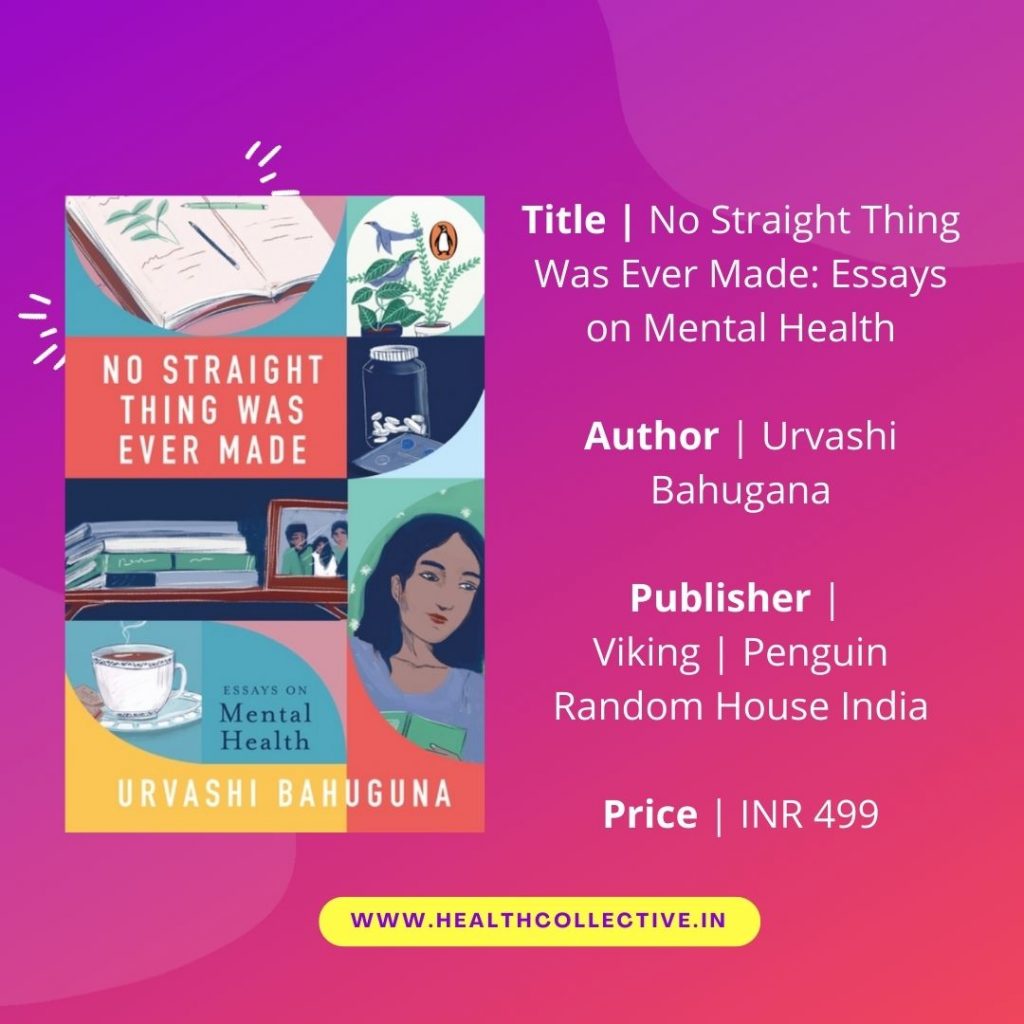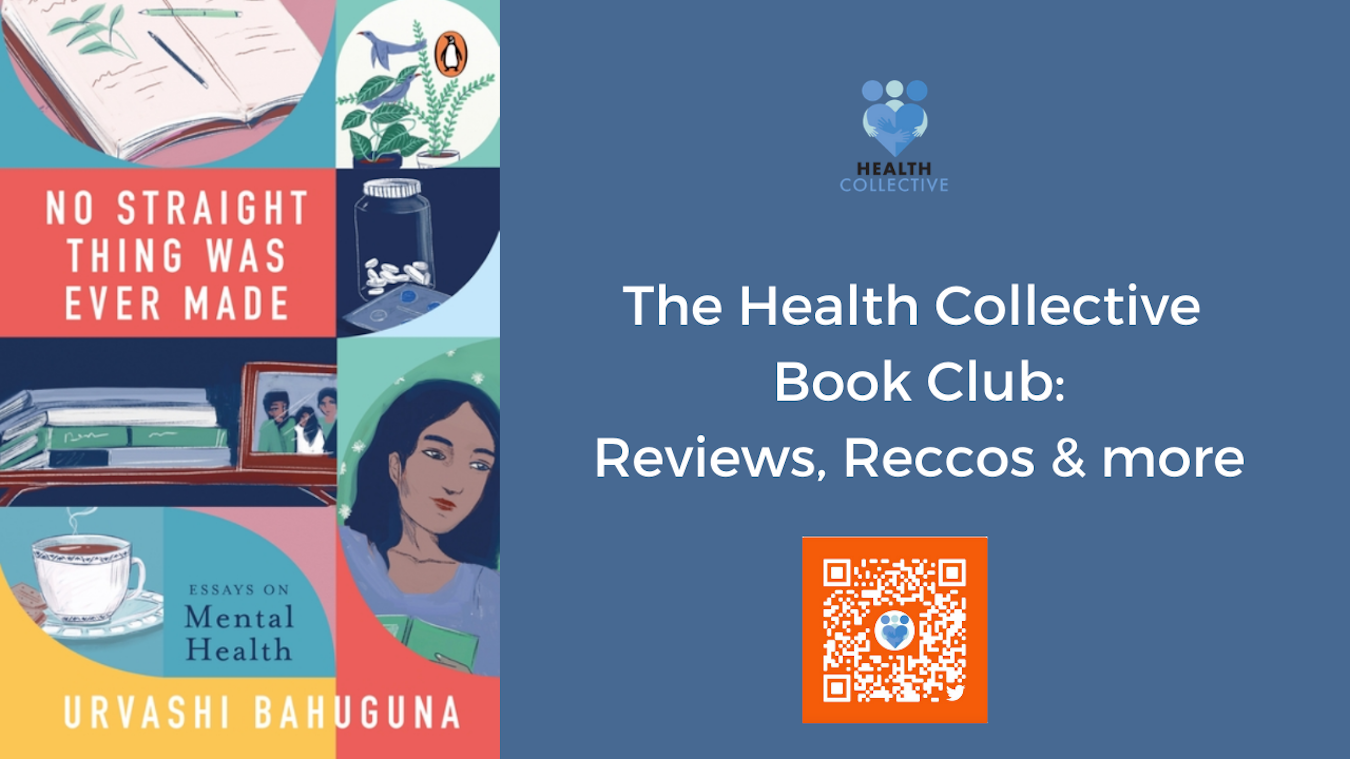We Write What we Cannot Speak: A Review of ‘No Straight Thing Was Ever Made’
By Tanmoy Goswami
IT IS HARD TO sit in judgment over the archive of someone’s hurt. There is something immoral about quibbling over the literary merit of a book containing someone’s rawest vulnerabilities. There is only one yardstick to assess the value — value, not quality, because quality is subjective but value is concrete — of such a book. Does it appear honest? Can you rely on it? If it were the only book you ever read on the subject, would it be enough?
Urvashi Bahuguna’s No Straight Thing Was Ever Made is a book that comes across as just that — enough. This is a book of considerable quality, but as a map of a mind in turmoil, unique to the writer and yet profoundly universal, it is a book of even greater value. That it manages to do its work in under 200 pages is particularly welcome, considering mental illness isn’t exactly a breezy topic to read about.
The act of writing and publishing depression memoirs — heck, even gaining access to the knowledge that you might have the illness — is steeped in privilege. This reviewer can attest to that from personal experience. If you keep aside this elitism germane to the genre, the guilty epiphany that this is a book about PLUs — people like us — Bahuguna’s words possess an incandescence that should help dispel the fog that engulfs mental illness despite its rising stock in the media and popular culture.
Bahuguna’s project is not explicitly political. She doesn’t directly take on the intersectional nature of mental health, or its social justice underpinnings. But in the process of teasing out the minute interiorities of her own experience, she establishes that mental health is the outcome of a constant ping pong match between your mind-body and your environment, a contest that you have little control over. In a chapter titled ‘Everything for this beauty: on self-perception, judgement and the body’, she writes:
“The doctor and I often get into disagreements, because he wants to prescribe the medicine that is best for me, but I want the one that won’t make me fat. Because the thinner I am and the less convex the stomach, the fewer anxieties I hold.”
Urvashi Bahuguna

The book is overflowing with insights like this, private at first glance and yet uncomfortably relatable because they are a commentary on the ‘system’ that makes us hate ourselves and drives us into undeserving despair — a default symptom of many mental illnesses. And isn’t that the hallmark of the best kind of political writing?
Ultimately, though, the greatest value of this book lies in the way it manages to weave that gossamer we call hope, the more precious because it is unexpected.
“Working on these essays” — ten of them, on subjects ranging from coping with family to romantic relationships to suicide to technology — “took more from me than I could have foreseen,” Bahuguna writes early on. “It taught me that mental illness is unpredictable and can cause the best-laid plans to be driven off course. I learnt that having unrealistic expectations about my productivity is short-sighted and unfair to myself.”
But, she adds, “I repaired relationships as a consequence of the questions and realizations that arose while writing and editing. I found that one can love what one does not love all of.”
Towards the end of the book, Bahuguna devotes a chapter on birdwatching and gardening as exercises in healing. This isn’t my thing, you might be tempted to say when you start reading it, but persevere and you will be rewarded with paragraphs like this:
‘A convict named Michele Scott, who has gardened outside her prison cell for more than two decades, writes in an essay, ‘What I do for plants is very different from how this place handles me.’ I am struck by her gentle, careful work in an ungentle, uncaring space, struck by the fact that she has given her years of imprisonment a nurturing frame. What I do for my plants is a primer, Scott makes me realize, on how to handle myself.”
***
IN 1784, IMMANUEL KANT wrote a sentence that continues to be astonishingly true:
“Out of the crooked timber of humanity, no straight thing was ever made.”
In Bahuguna’s hand, the latter clause of this quote loses its judgmental quality. No Straight Thing Was Ever Made isn’t a repudiation of human nature — the myriad ways in which families and lovers fail us and we fail them. It is an admission that there exists a fatal flaw in the warp and weft of humanity, which makes it inevitably vulnerable to wear and tear.
Some are able to have this diagnosed as a condition — depression, anxiety — and set out on the path to recovery, however winding and frustrating. Others must live with the knowledge of the crookedness of being, afraid that putting a diagnostic label on it will make it more real, or simply unable to get to medication, therapy, a ‘nurturing framework’.
Bahuguna is a poet first, a student of poetry, and generally a collector of good writing, many examples of which make their way into this book. Sometimes this could make you impatient, because you want more of Bahuguna’s own voice and less of Arthur W Frank and Lucille Clifton and Katy Maxwell. But it is difficult to stay miffed when Rachel McKibbens makes an appearance with a sentence that will make every memoirist of mental illness sigh with recognition:
“Sometimes, we write about it so we don’t have to talk about it.”
The Dalit Bengali writer Manoranjan Byapari, who lived in spite of soul-destroying poverty and hunger, the kind that makes you snatch bread from the mouth of a dog, confesses in his autobiography: “I write because I cannot kill.”
One way or another, remembering and embalming memories of unspeakable pain in writing is an act of preserving life. No Straight Thing Was Ever Made is a moving tribute to this most elemental of impulses.
About the Author: Tanmoy Goswami is a Delhi-based journalist, formerly with The Correspondent, probably the first and possibly the only ‘Sanity Correspondent’ in the world. He is the author of the ‘Sanity’newsletter and writes on the politics, economics and science of mental health, driven by his lifelong personal tryst with Depression and Anxiety. You can find him @Toymango on Twitter.
Views expressed are personal. Do share your feedback with us – Tweet us @healthcollectif
ALSO READ:
LATEST POSTS ON THE HEALTH COLLECTIVE




